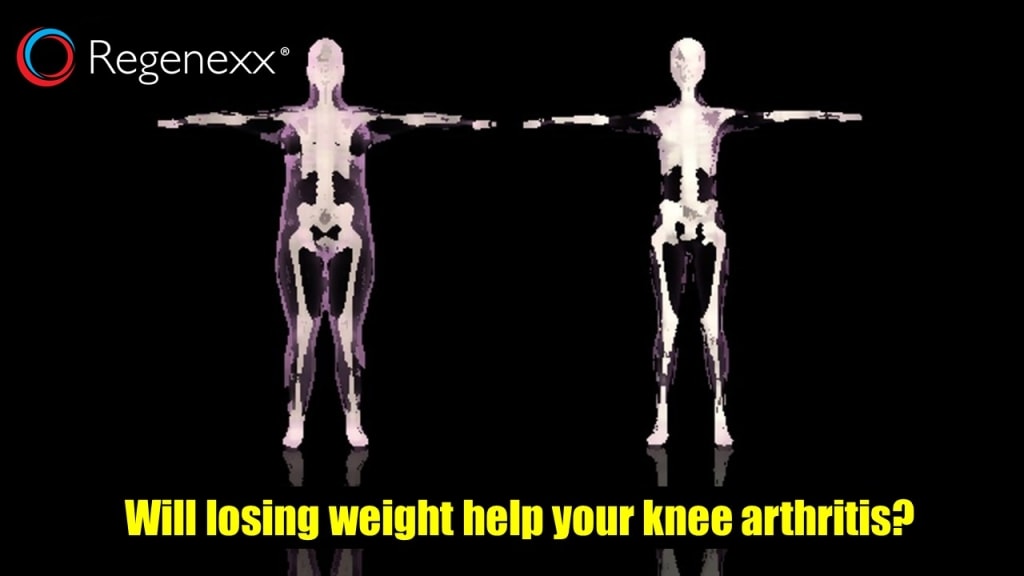Overweight with Knee Pain? Will Losing Weight Help Your Knees?
If you’re overweight with knee pain, you ask a lot of your knees. It doesn’t take a physics major to understand that the more weight our knees have to carry, the more physical stress our knees must endure. We already know that weight gain increases the load on our knees, leading to pain, arthritis, and an increased risk for knee replacement. But what if we lose the extra weight, and what if some damage has already been done? Will losing weight help your knees?
New Study Shows Losing Weight Helps Knees
According to a recent study, losing weight really does help your knees! The study looked at 158 overweight patients with mild to moderate knee osteoarthritis, who, over a period of 48 months, lost a moderate (5–10% of weight lost) to large amount (≥ 10% of weight lost) of weight. While weight loss won’t reverse the degeneration, the study concluded that weight loss can slow its progression and improve your knee symptoms.
What Happens to Your Knees if You Don’t Lose Weight?
If you’re overweight with knee pain, each pound you gain increases the forces on the knee fourfold. So losing a pound would have the opposite effect, taking off four times as much weight from your knees when you walk. I already mentioned knee pain, arthritis, and the possibility of knee replacement, but knee replacements in patients who are overweight are also more dangerous due to the potential for complications, which includes massive blood vessel damage caused by amputating an arthritic knee in heavier patients.
A study in the Journal of Bone and Joint Surgery (2015 Mar 04), found that overweight knee replacement patients also have more endothelial microparticles (EMPs) floating around their veins. EMPs are tiny packets released by stressed-out or dying blood-vessel cells that can upset the normal body balance in creating new healthy blood vessels. Essentially, EMPs are an indicator of vascular health—the more of them we find, the worse the status of the vessels. They’re found in higher quantities in many diseases, such as hypertension and type 2 diabetes.
In addition, overweight patients have fewer helpful blood vessel stem cells and more bad chemicals. All of these findings paint a picture consistent with other research that shows that heavier patients have more complications with knee replacement; these study findings may just point to why.
Being Overweight with Knee Pain Is More Than Just Extra Force
While the mechanics of obesity are number 1 on our list of top 10 causes of cartilage loss, it’s not just about the mechanics. Number 2 on our list is the biochemical aspects of obesity. Biochemical means the chemical reactions or processes in our bodies, and in this case, the chemical reactions that occur when we are obese or overweight.
There are changes to the insulin system in patients who are overweight. We know, for example, that blood sugar control problems, like those seen in patients with metabolic syndrome, chew up cartilage. Cartilage is a firm, flexible cushion for a joint that covers both ends of the bone and provides a smooth surface with little friction. It helps our joints move easily and comfortably. When you lose or damage cartilage from a joint like the knee, this is one definition of arthritis. Metabolic syndrome is defined by obesity (apple or pear body), high blood pressure, and early diabetes. This syndrome itself (without factoring in weight gain) dramatically destabilizes the chemical matrix (structure) of cartilage. We know that patients who are heavier with high blood pressure and insulin problems (metabolic syndrome) also have worse knee and hip replacement outcomes.
Another biochemical reaction that may result in knee pain in those who are overweight has to do with leptin. Leptin is a hormone that acts on the brain to regulate food intake and body weight. It’s like a traffic light turning red, telling us we’re full. Patients who are heavier become more and more blind to that red light, choosing to run it instead of heeding its warning. This builds a resistance to leptin, so they have a harder time feeling full. One study on leptin showed that patients who have higher leptin levels, a decade later show more arthritis on knee MRIs. This includes more bone spurs, joint swelling, cartilage defects, meniscus tears, and bone swelling.
How to Combat the Weight and Help Your Knees
If you’re overweight with knee pain, taking off even a few pounds may make a difference, but the closer you can get to your ideal weight the more you can improve your knee symptoms and slow the progression of damage. Start a low-glycemic diet to help reduce the effects of a metabolic syndrome. Diets that seem to work are The Zone, Atkins, and the South Beach Diet. Our own Dr. Pitts has put together a great book you can read-Nutrition 2.0.
The upshot? It’s just common mechanical sense that more weight equals more wear and tear on our knees. Add to this the biochemical reactions that occur with weight gain and an unhealthy diet, and you’re brewing up a violent biological storm that can end in a knee replacement. Start losing weight now to take some of the oomph out of that storm and slow the progression of knee degeneration and help your knees!

If you have questions or comments about this blog post, please email us at [email protected]
NOTE: This blog post provides general information to help the reader better understand regenerative medicine, musculoskeletal health, and related subjects. All content provided in this blog, website, or any linked materials, including text, graphics, images, patient profiles, outcomes, and information, are not intended and should not be considered or used as a substitute for medical advice, diagnosis, or treatment. Please always consult with a professional and certified healthcare provider to discuss if a treatment is right for you.

